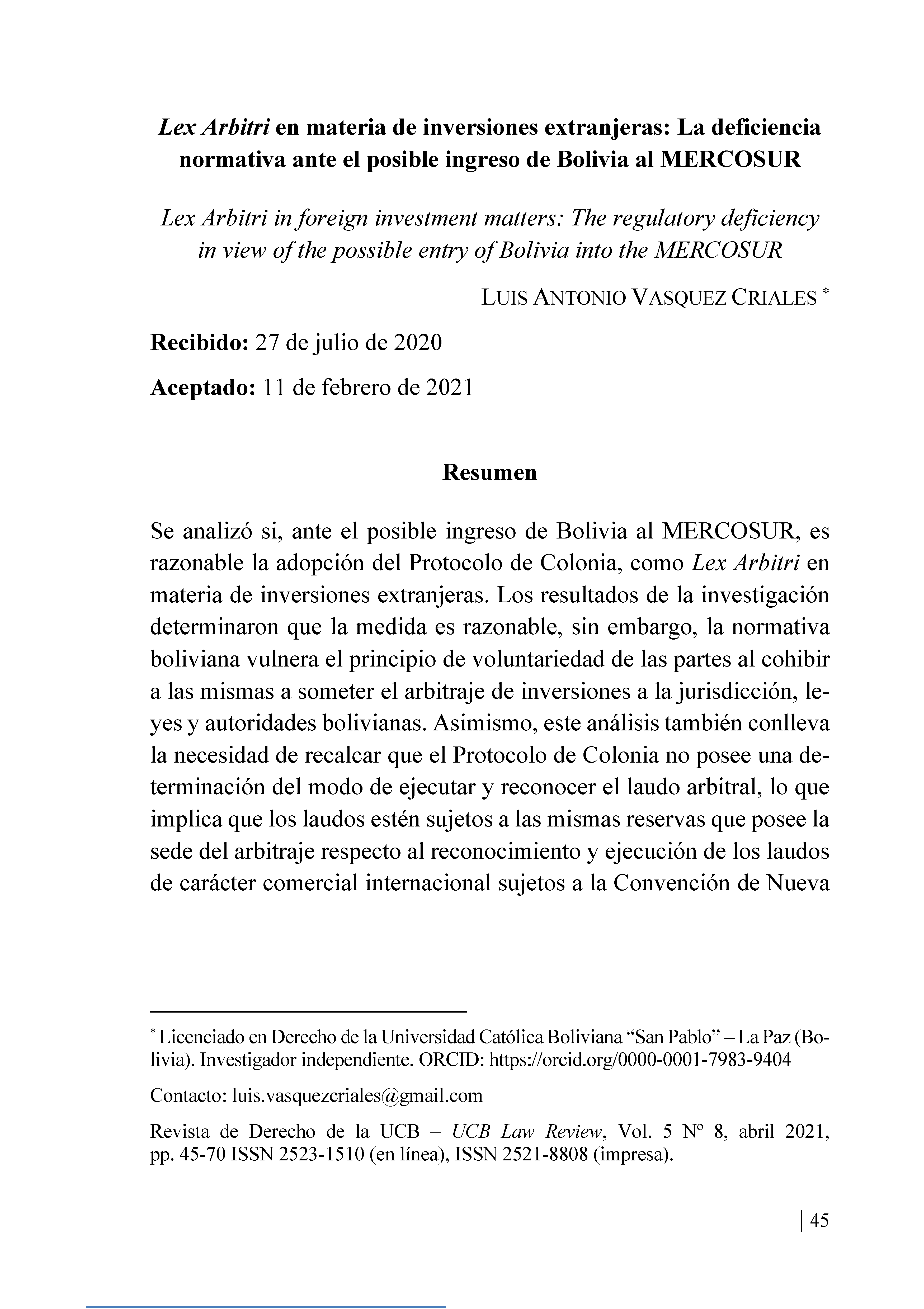Lex Arbitri in foreign investment matters: The regulatory deficiency in view of the possible entry of Bolivia into the MERCOSUR
DOI:
https://doi.org/10.35319/lawreview.2021858Keywords:
Lex Arbitri, investment arbitration, principle of voluntariness, jurisdiction, laws and authorities, enforce and recognize the award, annulment mechanismAbstract
Given the possibly entry of Bolivia into the MERCOSUR, it was analyzed if the adoption of the Protocolo de Colonia, as a Lex Arbitri in foreign investment matters, is reasonable. The results of the investigation determined that the measure is reasonable; nevertheless, the Bolivian regulations violate the principle of voluntariness of the parties by restraining them to submit the investment arbitration to the Bolivian jurisdiction, laws and authorities. Likewise, this analysis also implies the need to emphasize that the Protocolo de Colonia does not have a determination of how to enforce and recognize the arbitration award, which implies that the awards are subject to the same reservations that the seat of arbitration has regarding the recognition and enforcement of international commercial awards subject to the New York Convention. Therefore, the search for a satisfactory international investment arbitration system for Bolivia not only involves the need to previously adapt the internal regulations in accordance with the referred integration process, but it is also necessary to define specific cases in which the States can resort to an annulment mechanism provided by MERCOSUR.
Downloads
References
Bělohlávek, A. (2015). Seat of Arbitration and Supporting and Supervising Function of Courts. República Checa, pág. 21.
Born, G. (2016). International arbitration: Law and practice. Estados Unidos. Edit. Kluwer Law International
Caivano, R. (2017). La sede del arbitraje. Revista El Derecho, 14.
Castillo, M. (2007). Arbitraje y debido proceso. Lima
Martin, R. (2009). Lecciones de Arbitraje Internacional y de las Inversiones (Primera). La Paz, Bolivia: VerbaLegis.
Martin, R. (2014). Arbitraje. Introducción al Derecho Arbitral (Segunda). La Paz, Bolivia: Oscar Gutiérrez Peña.
Romero Silva, E. (2005). El contrato de arbitraje: La formación del contrato de arbitraje. Bogotá D.C., editorial Legis
Singapore Academy of Law Journal (2014). Lex Arbitri, procedural Law and the seat of arbitration. Singapur, pág. 887.
Sánchez, S. (2009). Derecho aplicable al fondo de la controversia en el arbitraje comercial internacional, España, pág. 42.
Sánchez, S. (2010). La interpretación del contrato internacional: Una aproximación desde el Derecho comparado. México, págs. 131-183.
Salcedo Castro, M. (2005). Arbitrabilidad subjetiva: la capacidad de las entidades públicas para concluir contratos de arbitraje, en: Eduardo Silva Romero y Fabricio Mantilla Espinoza, El Contrato de Arbitraje, Bogotá D.C, Editorial Legis, 2005, p. 113.
Vásquez Palma, M. (2014). Arbitralidad Objetiva: Delimitación e importancia. Recuperado en fecha 29 de abril de 2019 de http://www.arbitrajecomercial.com/BancoConocimiento/A/arbitralidad_objetiva_delimitacion_e_importancia/arbitralidad_objetiva_delimitacion_e_importancia.asp?CodSeccion=15.
Constitución Política del Estado de 07 de febrero de 2009. Gaceta Oficial de Bolivia del Estado Plurinacional de Bolivia. Edición oficial.
Ley 708 de Conciliación y Arbitraje, de 25 de junio de 2015. Procuraduría General del Estado Plurinacional de Bolivia. Recuperado en fecha 25 de marzo de 2019 de http://www.procuraduria.gob.bo/images/docs/Ley%20de%20Conciliacion%20y%20Arbitraje.pdf
Centro Internacional de Arreglo de Diferencias Relativas a Inversiones (CIADI). Reglamento del Mecanismo Complementario (2006). Recuperado en fecha 24 de marzo de 2019 de https://icsid.worldbank.org/sites/default/files/amendments/AFR_%202006_Spanish_final.pdf
Comisión de las Naciones Unidas para el Derecho Mercantil Internacional (CNUDMI). Ley Modelo de la CNUDMI sobre Arbitraje Comercial Internacional (1985 con las enmiendas aprobadas en 2006). Recuperado en fecha 21 de marzo de 2019 de https://www.uncitral.org/pdf/spanish/texts/arbitration/ml-arb/07-87001_Ebook.pdf
Convención sobre el reconocimiento y la ejecución de las sentencias arbitrales extranjeras (Convención de Nueva York) (1958). Recuperado en fecha 21 de junio de 2020 de http://www.newyorkconvention.org/spanish
Convenio Europeo sobre Arbitraje Comercial Internacional Hecho en Ginebra el 21 de abril de 1961. Recuperado en fecha 21 de junio de 2020 de https://www.cocin-cartagena.es/wp-content/uploads/2013/08/TR03.pdf
Convenio sobre Arreglo de Diferencias Relativas a Inversiones entre Estados y nacionales de otros Estados (Convenio del CIADI) (1966). Recuperado en fecha 21 de junio de 2020 de https://icsid.worldbank.org/sites/default/files/documents/ICSID%20Convention%20Spanish.pdf
Mercado Común del Sur (MERCOSUR). Protocolo de Colonia para la Promoción y Protección Recíproca de Inversiones (1994). Recuperado de https://www.bcb.gov.br/rex/sgt4/Ftp/CD%20Fluxograma/Tratados%20e%20Protocolos/Protocolo%20de%20Colonia.pdf
Mercado Común del Sur (MERCOSUR). Tratado para la Constitución de un Mercado Común entre la República Argentina, la República Federativa del Brasil, la República del Paraguay y la República Oriental del Uruguay. Recuperado en fecha 9 de noviembre de 2018 de https://idatd.cepal.org/Normativas/MERCOSUR/Espanol/Tratado_de_Asuncion.pdf
Tratado de Libre Comercio de América del Norte (TLCAN) (1994). Recuperado en fecha 21 de junio de 2020 de https://idatd.cepal.org/Normativas/TLCAN/Espanol/Tratado_de_Libre_Comercio_de_America_del_Norte-TLCAN.pdf
International Centre for Trade and Sustainable Development. (2017). Ingreso pleno de Bolivia al MERCOSUR está pendiente de la ratificación de Brasil. Recuperado 31 de octubre de 2018, de https://www.ictsd.org/bridges-news/puentes/news/ingresopleno-de-bolivia-al-mercosur-est%C3%A1-pendiente-de-laratificaci%C3%B3n-de

Downloads
Published
How to Cite
Issue
Section
License
The U.C.B. Law Review is an Open Access Journal, therefore, it is full free for access, reading, search, dowload, distribution and lawfull reuse in any medium only for non-comercial purposes, provided the original work is properly cited.








